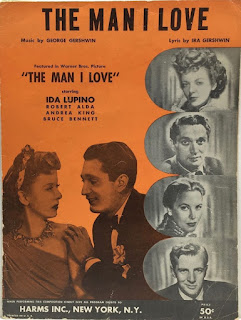Petey Brown (Ida Lupino) is moderately successful as a torch singer in a New York club, but it is nearing Christmas and Petey misses her sisters and brother in California. She arrives on the West Coast to find her brother Joey (Warren Douglas) working for nightclub owner Nicky Toresca (Robert Alda); sister Sally Otis (Andrea King) dealing with her husband Roy’s (John Ridgely) post-war mental issues; and sister Virginia (Martha Vickers) avoiding the world. Petey decides she better stay to set things in order. Our film this week is The Man I Love (1947).
While there is nothing extraordinarily unique about the story, this is a fantastic film, with an exceptional cast. The focal point is the always stunning Ida Lupino as a determined and strong woman. Even when we think she is weakening, Petey bounces back and dominates every scene and the situation. She is supportive of her sisters and brother, and glides in and out of their lives like the hero in a western - she stays while they need her, then rides off into the sunset! Ms. Lupino was not the first choice for Petey; Warner’s purchased it with Ann Sheridan in mind (AFI catalog). Peg LaCentra provided Ms. Lupino's singing voice in this film, though later (in Road House), she did her own singing (Ida Lupino, Director: Her Art and Resilience in Times of Transition by Therese Grisham and Julie Grossman).
Also providing a noteworthy performance is Robert Alda. A highly-regarded singer, Mr. Alda - the original Nathan Detroit on Broadway, (and the father of actor Alan Alda) - does not sing here. As Nicky Toresca, he is as far from the boy singer as you can get. Nicky is sleazy - first he is on the prowl for Sally Otis, then Petey, and eventually Sally’s neighbor Gloria O'Connor (Dorothy Moran). Mr. Alda bring a smoothness tinged with menace to Toresca. It’s clear he is interested in Petey primarily because she is not interested in him, making the character all the more perverse. Like Ms. Lupino, Mr. Alda wasn’t even the first choice for the role - originally it was intended for Humphrey Bogart; later Jack Carson was scheduled to do it (Music in the Shadows: Noir Musical Films by Sheri Chinen Biesen).
Bruce Bennett (San Thomas) spends much of his time in his films being a forlorn and moody victim (for example, his turn as Bert Pierce in Mildred Pierce), but it works in this film. San spends much of The Man I Love pining for his ex-wife; the audience gets to shake their respective heads at his denseness. Why on earth is he still mourning this feckless woman when he has the magnificent Ida waiting for him? However, faced with Petey's determination, the viewer is left with the feeling that San will be getting over his past in time. Dane Clark was also considered for the role; he surely would have brought an entirely different vibe to the character.
The film is blessed with an excellent supporting cast: Andrea King's almost matches Petey with her strength of character. Faced with a husband who has been hospitalized following his service in the Army, she is forced to work to support her young son, as well as deal with a husband whose illness causes him to expresses his hatred for her when she is able to visit. Dorothy Moran as the next-door neighbor with a husband, twin babies, and a penchant for the night life that husband Johnny (Don McGuire) can't afford, is convincing as a lady with more than housework on her mind. The few brief scenes in which Alan Hale appears are always a pleasure. As Riley, Toresca's good natured assistant, he brings a bit of comic relief to the proceeding. Both Craig Stevens (Johnson) and Florence Bates (Mrs. Thorpe) have minor parts - blink and you will miss them. Also worth noting are the beautiful gowns that were designed by Milo Anderson, one of which was so tight, Mr. Lupino had to be literally cut out of it (see below).
Ms. Lupino became ill during the filming, at one point fainting during a scene (partially caused by the tightness of her dress) - Mr. Alda caught her before she hit the ground. (Ida Lupino: A Biography by William Donati). As a result of her illness, the film ran 19 days overtime and $100,000 over budget (TCM article). It did earn a profit, however, and came in at number 71 on the year's list of top grossing movies (Ultimate Movie Rankings).
We'll leave you with a trailer and the suggestion you keep your eyes peeled for this one:




No comments:
Post a Comment
Thanks for your interest in this blog. Your comments will be moderated to minimize spam to the website. Thanks for understanding.